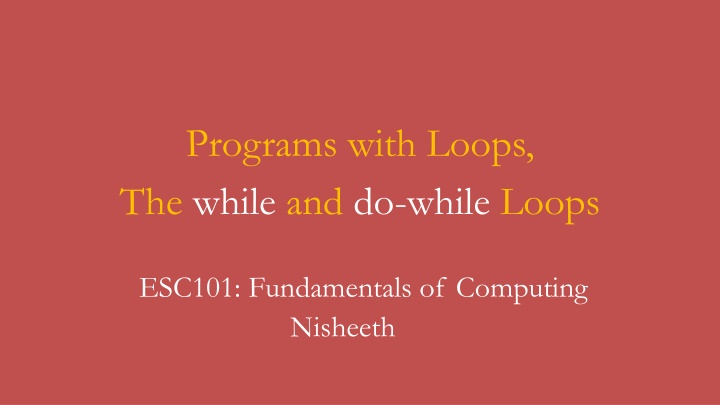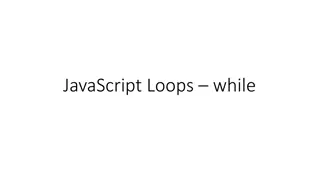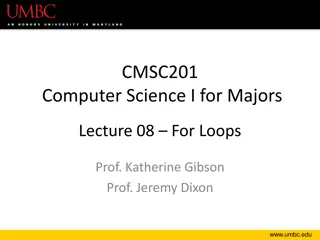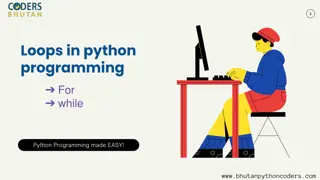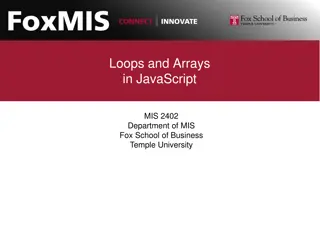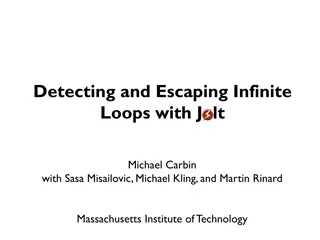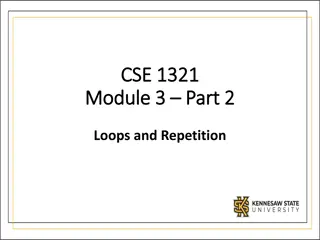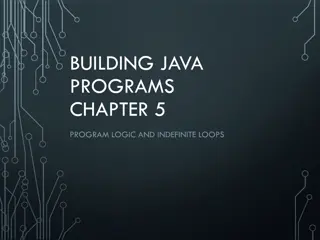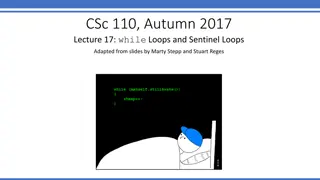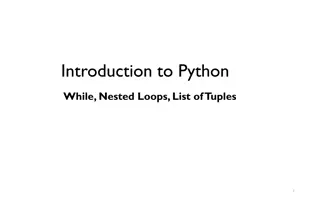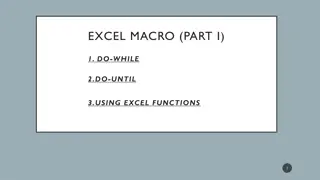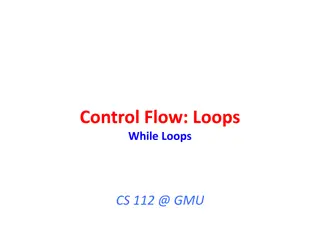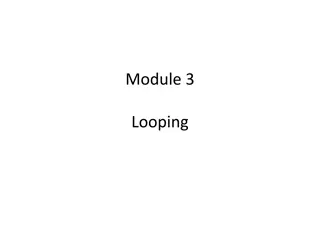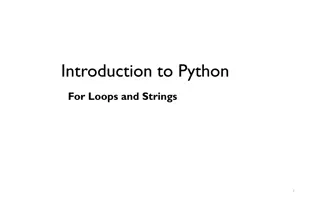Programs with Loops: while and do-while Loops
Learn about the fundamentals of computing with the while and do-while loops. Understand the syntax, execution flow, and examples of using for loops in programming. Dive into practical examples of initializing variables, setting stopping conditions, and updating expressions within loops.
Download Presentation

Please find below an Image/Link to download the presentation.
The content on the website is provided AS IS for your information and personal use only. It may not be sold, licensed, or shared on other websites without obtaining consent from the author.If you encounter any issues during the download, it is possible that the publisher has removed the file from their server.
You are allowed to download the files provided on this website for personal or commercial use, subject to the condition that they are used lawfully. All files are the property of their respective owners.
The content on the website is provided AS IS for your information and personal use only. It may not be sold, licensed, or shared on other websites without obtaining consent from the author.
E N D
Presentation Transcript
Programs with Loops, The while and do-while Loops ESC101: Fundamentals of Computing Nisheeth
Announcements Major Quiz 1 tomorrow (L-20, 12:00-12:50). Instructions already shared Must write your name on answer sheets (minor/major quizzes/exams) Your responsibility. If you miss, it makes it very hard/impossible for us to locate it 2
Recap: for Loop General form of the for loop for(init_expr; stopping_expr; update_expr){ statement1; statement2; ... } statement3; statement4; ... Execute update expression Go back to step 2 Else stop looping and execute rest of code Brackets essential if you want me to do many things while looping Initialization expression is executed only once What this piece of code means? 1. First do what is told in initialization expression 2. Then check the stopping expression 3. If stopping expression is true Execute all statements inside braces ESC101: Fundamentals of Computing
int i; float rsum = 0.0; // sum of reciprocals i rsum 0.0 1.0 1.5 1 2 3 4 5 1.833333.. 2.0833333.. for (i=1; i<=4; i=i+1) { rsum = rsum + (1.0/i); } rsum = 1 + 1/2 + 1/3 + 1/4 printf( sum of reciprocals is %f , rsum); Evaluate init_expr; i.e., i=1; Evaluate test_expr i.e., i<=4 TRUE Enter body of loop and execute. Execute update_expr; i=i+1; i is 2 Evaluate test_expr i<=4: TRUE Enter body of loop and execute. Execute i=i+1; i is 3 Evaluate test_expr i<=4: TRUE Enter body of loop and execute. 1. 9. 10. Execute i=i+1; i is 4 11. Evaluate test_expr i<=4: TRUE 12. Enter body of loop and execute. 13. Execute i=i+1; i is 5 14. Evaluate test_expr i<=4: FALSE 15. Exit loop & jump to printf 2. 3. 4. 5. 6. 7. 8. sum of reciprocals is 2.083333 ESC101: Fundamentals of Computing
The for Loop: More on its syntax.. Many forms possible for the init/stopping/update expressions. Some examples: init_expr can also be before the start of for loop update_expr can also be inside the body of for loop for (i=1;i <= 10; i+=2) for (i=1;i <= 64; i*=2) Learn more by practicing for (i=-5,i <= 10; i++) for (i=10;i >= 0; i--) for (i=1;i <= 10; i++){ for(j=1; j<= i; j++){ } } for (i=1,j=2;i <= 10 && j <= 20; i++,j=j+2) Multiple loop counter variables for the init/ stopping/update expressions Inner loop s counter can depend on outer loop counter s current value ESC101: Fundamentals of Computing
The while loop General form of a while loop while(stopping_expr){ statement1; statement2; ... } statement3; statement4; ... Brackets essential if you want me to do many things while looping So what is the difference between for and while? In general not much it is a matter of style. Often we use while when we don t exactly know how many iterations will loop run (but usually it can be done with for loop too) What this piece of code does? 1. First check the stopping expression 2. If stopping expression is true Execute all statements inside braces Go back to step 2 Else stop looping and execute rest of code ESC101: Fundamentals of Computing
The while loop in action.. int a; scanf( %d , &a); /* read into a */ while ( a != -1) { scanf( %d , &a); /*read into a inside loop*/ } Trace of memory location a INPUT ?? 4 15 -5 -1 4 15 -5 -1 -3 One scanf is executed every time body of the loop is executed. Every scanf execution reads one integer. ESC101: Fundamentals of Computing
The do-while loop General form of a do-while loop do{ statement1; statement2; ... }while(stopping_expr); statement3; statement4; ... Brackets essential if you want me to do many things while looping Notice additional semi-colon When to use do-while instead of while? Yet another minor quiz question What this piece of code does? 1. First execute statements inside braces 2. Then check stopping criterion 2. If stopping expression is true Execute all statements inside braces Go back to step 2 Else stop looping, execute rest of code ESC101: Fundamentals of Computing
The use of do-while The do-while loop is executed at least once Example: read integers till you read the number -1 and to read than the other Notice proper indentation for while and do-while loops while and do-while equally powerful, sometimes one looks prettier, easier int num, sum = 0; scanf( %d , &num); while(num != -1){ sum += num; scanf( %d , &num); } printf("%d",sum); int num, sum = 0; do{ scanf( %d , &num); if(num != -1) sum += num; }while(num != -1); printf("%d",sum); ESC101: Fundamentals of Computing
Some more examples, tips, and guidelines on using loops 10
Properly Divide Task into Subtasks 1 1 2 1 2 3 1 2 3 4 ... 1 2 3 4 ... 10 Consider printing the pattern shown on right Step 1: Divide problem into smaller tasks that are very similar and have to be repeated Often, more than one way may seem possible. Not all may be implementable For this problem, column-wise printing will be hard. But row-wise printing seems like an implementable idea. Row i can be printed using the following for loop for(i=1;i<=10;i++){ for(j = 1; j <= i; j++) printf( %d , j); printf( \n ); } Example of nested for for(j = 1; j <= i; j++) printf( %d , j); printf( \n ); Can repeat the above for i = 1 to i = 10 using an outer loop ESC101: Fundamentals of Computing
Order of statements is important ESC101: Fundamentals of Computing
Order of statements is important int main(){ int n, i; float r, a, term; // Reading inputs from the user scanf("%f", &r); scanf("%f", &a); scanf("%d", &n); term = a; for (i=1; i<=n; i=i+1) { printf("%f\n", term); // Displaying ?? term term = term * r; // Computing ? + 1? term } return 0; } ESC101: Fundamentals of Computing
Order of statements is important int main(){ int n, i; float r, a, term; // Reading inputs from the user scanf("%f", &r); scanf("%f", &a); scanf("%d", &n); term = a; for (i=1; i<=n; i=i+1) { term = term * r; printf("%f\n", term); } return 0; } Careful: Changing the order of statements changes the meaning of the program. Computation of ?,??, ,??? 1 (previous program) ??,??2, ,??? (this program) ESC101: Fundamentals of Computing
The break keyword Allows us to stop executing a loop and exit immediately Even if the stopping condition is still true Can be used inside a for loop, while loop, do-while loop When to use break Avoid if possible Can make code error-prone and hard to read Used when one stopping condition not enough Or sometimes to make code more elegant Allows us to avoid specifying a stopping condition Note: Here, the else not even needed since Mr C. neglects all remaining statements in loop body upon encountering break; If we did not have break, infinite loop! int num, sum = 0; while(1){ scanf( %d , &num); if(num == -1) break; sum += num; } int num, sum = 0; while(1){ scanf( %d , &num); if(num == -1) break; else sum += num; } printf("%d",sum); printf("%d",sum); ESC101: Fundamentals of Computing
A fancy for loop using break If we did not have break this would have been an infinite loop since no stop_expr init_expr; for(;;){ if(!(stop_expr)) break; statement1; statement2; ... upd_expr; } statement3; statement4; for(init_expr; stop_expr; upd_expr){ statement1; statement2; ... } statement3; statement4; Remember, the order is stop_expr body update stop_expr ESC101: Fundamentals of Computing
The continue keyword Allows us to skip the rest of the statements in body of the loop Upon encountering continue, Mr C thinks that body of loop is over Loop not exited (unlike break) If we say continue in for loop, update_expr evaluated, then stop condition checked If we say continue in while or do-while loop, then stop condition checked In all cases, rest of body not executed Read 100 integers and print sum of only positive numbers int sum = 0, i, num; for(i = 1; i <= 100; i++){ scanf("%d", &num); if (num < 0){ continue; } sum += num; } ESC101: Fundamentals of Computing
Much better, always updates counter whether skipping the sum+=num If we have a sequence of 100000 negative numbers, it will read all of them even though we wanted to read only first 100 numbers continue statement skipping counter update step using continue or not Careful using break, continue If there are nested loops, a break inside the inner loop will apply only to the inner loop, same with continue Be careful not to create an infinite loop using continue if you bypass any update steps. int i = 0, sum = 0, num; while (i < 100){ i++; scanf( %d , &num); if (num < 0) continue; sum += num; int i = 0, sum = 0, num; while (i < 100){ scanf( %d , &num); if (num < 0) continue; sum += num; i++; } } for (i = 0; i < 100; i++){ for (j = 0; j < 100; j++){ if ( ) continue; } statement1; } for (i = 0; i < 100; i++){ for (j = 0; j < 100; j++){ if ( ) break; } statement1; } statement2 statement2 ESC101: Fundamentals of Computing
Careful using break, continue Excessive use of break and continue can make your program error-prone, and hard for you to correct If you have 10 break statements inside the same loop body, you will have a hard time figuring out which one caused your loop to end If you have 10 continue statements inside the same loop body, you will have a hard time figuring out why body statements are not getting executed. Should not misuse break, continue - used in moderation these can result in nice, beautiful code We will see some elegant alternatives to break, continue ESC101: Fundamentals of Computing
Break and Continue: Summary Break helps us exit loop immediately In for loops, even update_expr or stop_expr not checked just exit In while, do-while loops, even stop_expr not checked just exit Continue helps us skip the rest of the body of loop In for loops, after Mr C receives a continue statement, he evaluates the update_expr (if it s inside for() part), then checks the stop_expr and so on In while loops, after Mr C receives a continue statement, he checks the stop_expr Loop not exited just because of continue, stop_expr still controls exit Warning: Break legal only in body of loops and switch Illegal inside body of if, if-else statements Warning: Continue legal only in body of loops Illegal inside body of if, if-else, switch statements ESC101: Fundamentals of Computing
